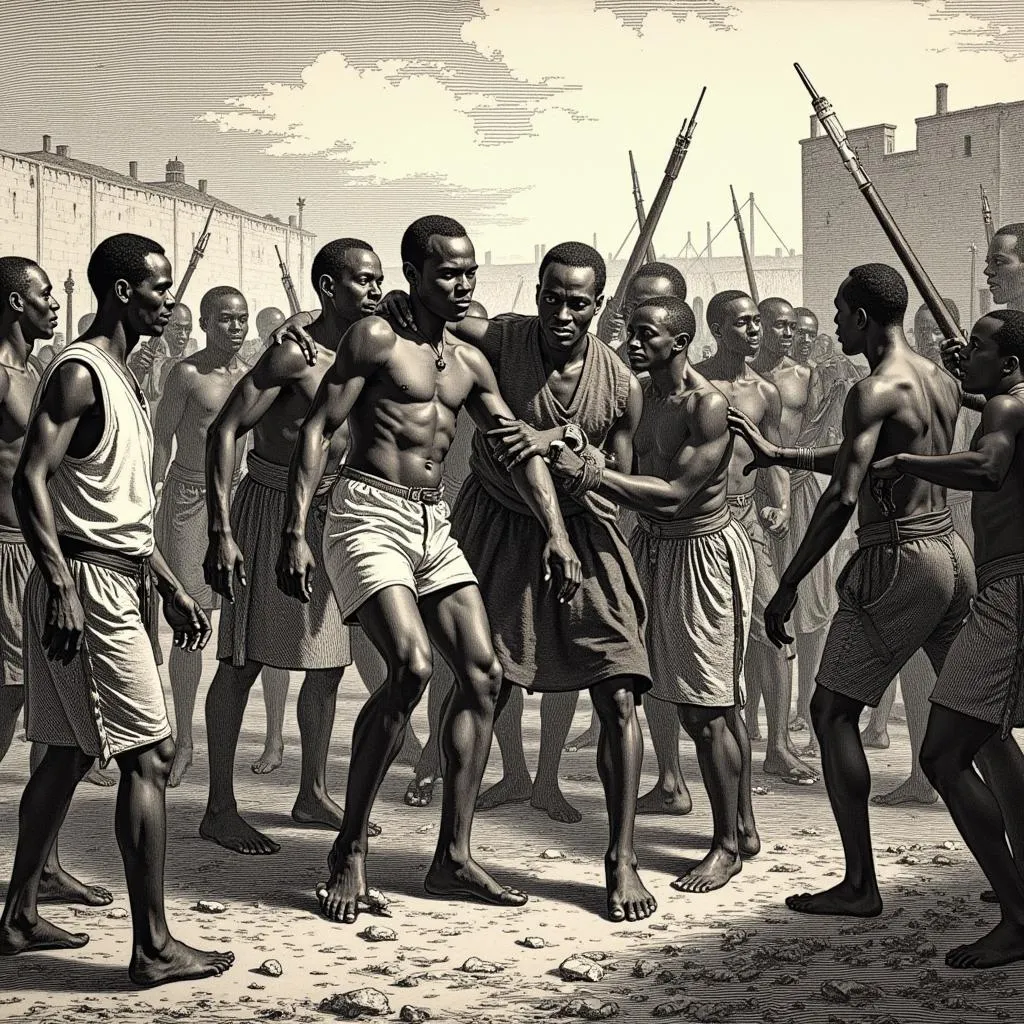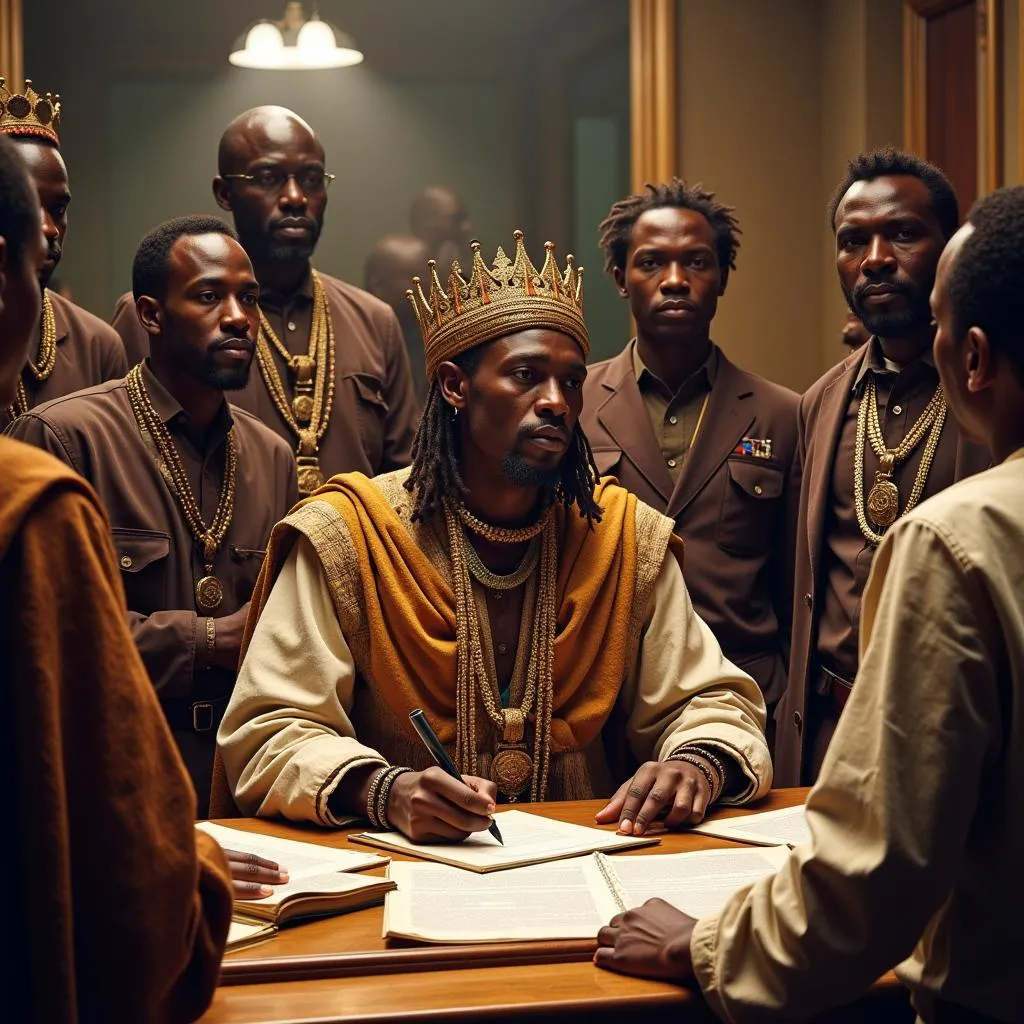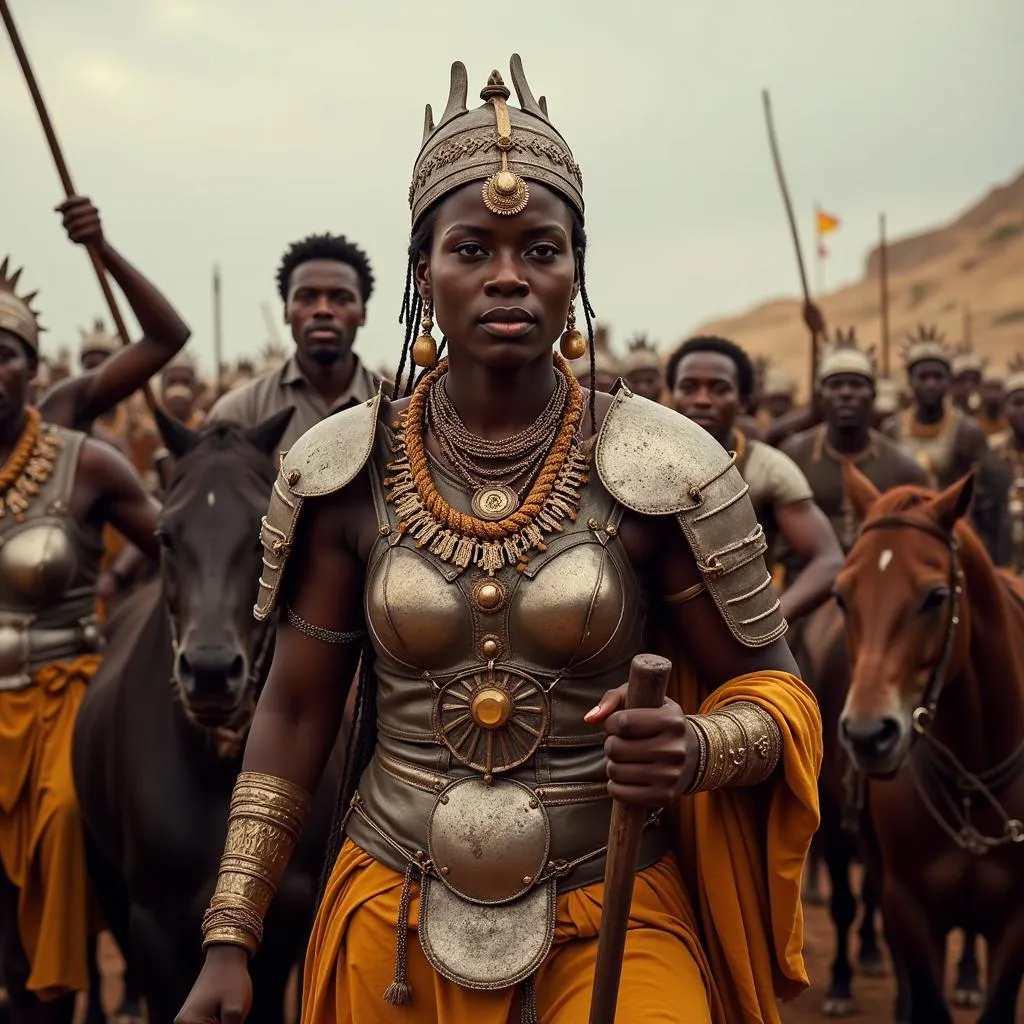African Kings and Queens Sold into Slavery: A Forgotten History
The transatlantic slave trade stands as one of history’s darkest chapters, casting a long shadow over Africa and its diaspora. While the image of enslaved Africans often conjures visions of nameless individuals forced onto ships, a less-told story lies hidden within this tragedy: the enslavement of African royalty. Yes, African Kings And Queens Sold Into Slavery were not an anomaly, but a devastating reality that shattered kingdoms and forever altered the continent’s fate.
The Powerful Fall: How Did African Royalty End Up Enslaved?
The transatlantic slave trade, flourishing between the 16th and 19th centuries, relied heavily on a complex web of power dynamics within Africa. European powers, driven by insatiable greed for profit and resources, lacked the manpower to simply invade and capture millions of people. Instead, they exploited existing rivalries and power structures within Africa to fuel their horrific enterprise.
 African rulers captured during slave raids
African rulers captured during slave raids
The Role of Internal Conflicts and Warfare
Internal conflicts and warfare played a significant role in the enslavement of African royalty. Kingdoms at war often saw the capture of enemy leaders and their families as valuable bargaining chips. These high-ranking captives could be ransomed back for significant wealth or traded to European slave traders for desired goods, including weapons, gunpowder, alcohol, and sadly, even more slaves. This created a vicious cycle where the demand for slaves fueled further conflict and instability, leading to the capture of even more people, including those in positions of power.
The Deception of “Legitimate Trade”
European powers often disguised their involvement in the slave trade under the guise of “legitimate trade.” They established trading posts along the African coast, initially offering seemingly harmless goods in exchange for local products like gold, ivory, and spices. However, this facade of fair trade quickly crumbled as the insatiable demand for enslaved Africans grew. African rulers, enticed by the promise of wealth and power, found themselves entangled in a system that ultimately undermined their own authority and led to the enslavement of their own people, sometimes even members of their own families.
 African king forced to sign treaties with European traders
African king forced to sign treaties with European traders
Betrayal and the Rise of Slave Trading Kingdoms
The lure of profit from the slave trade proved too tempting for some African kingdoms. Certain rulers, driven by greed or political ambition, actively participated in the capture and sale of enslaved Africans. They launched raids on neighboring kingdoms, capturing and selling their enemies to European traders. This betrayal within Africa contributed significantly to the trade’s scale and devastation, with entire populations decimated and communities torn apart.
Stories of Resistance: African Royalty Fighting Back
While the transatlantic slave trade inflicted unimaginable suffering on Africa, it’s crucial to remember that Africans were not passive victims. Acts of resistance, both large and small, punctuated the history of the trade, and African royalty played a significant role in this fight for freedom.
Queen Nzinga: A Symbol of Defiance
Queen Nzinga Mbande of Ndongo and Matamba (modern-day Angola) stands as a beacon of resistance against the slave trade. In the 17th century, facing relentless attacks from Portuguese slave traders, Queen Nzinga led her people in a fierce struggle for independence. She formed alliances with neighboring kingdoms, employed skilled guerilla warfare tactics, and even negotiated treaties with the Portuguese on her own terms. Queen Nzinga’s unwavering determination and strategic brilliance made her a formidable opponent and a powerful symbol of African resistance.
 Queen Nzinga leading her army against the Portuguese
Queen Nzinga leading her army against the Portuguese
King Agaja Trudo: Choosing Freedom Over Profit
In the 18th century, King Agaja Trudo of Dahomey (present-day Benin) took a bold stance against the slave trade. Disgusted by the human cost of the trade that had enriched his predecessors, King Agaja Trudo sought to end his kingdom’s involvement. He outlawed the slave trade within his domain and offered protection to those fleeing enslavement. His actions, though opposed by some within his kingdom who benefited from the trade, demonstrated a commitment to justice and humanity over personal gain.
The Enduring Legacy: Remembering the Kings and Queens Lost to Slavery
The transatlantic slave trade may have ended in the 19th century, but its legacy continues to resonate throughout the African diaspora. The forced removal of millions of Africans, including kings, queens, and entire royal families, resulted in a profound loss of cultural heritage, knowledge, and leadership.
Remembering the stories of these forgotten kings and queens is not merely an act of historical preservation; it’s a vital step in understanding the complexities of the slave trade and its enduring impact on Africa. Their stories serve as a reminder of the strength and resilience of the African people, even in the face of unimaginable adversity. By honoring their memory and understanding their stories, we can work towards a future where the horrors of the past are never repeated.
FAQ:
- How did the slave trade affect the power dynamics within Africa?
- Were there any successful slave revolts led by African royalty?
- What happened to African kings and queens after they were sold into slavery?
- How can we learn more about the specific stories of enslaved African royalty?
- What are some resources for further research on this topic?
For more information on African history and the impact of the slave trade, explore our other articles:
- The Legacy of Colonialism in Africa
- The African Diaspora: A Global Tapestry
- Reclaiming African History: Truth, Justice, and Reconciliation
Need help tracing your African ancestry? Contact our team of experts:
Phone: +255768904061
Email: kaka.mag@gmail.com
Address: Mbarali DC Mawindi, Kangaga, Tanzania
We are here to assist you 24/7.